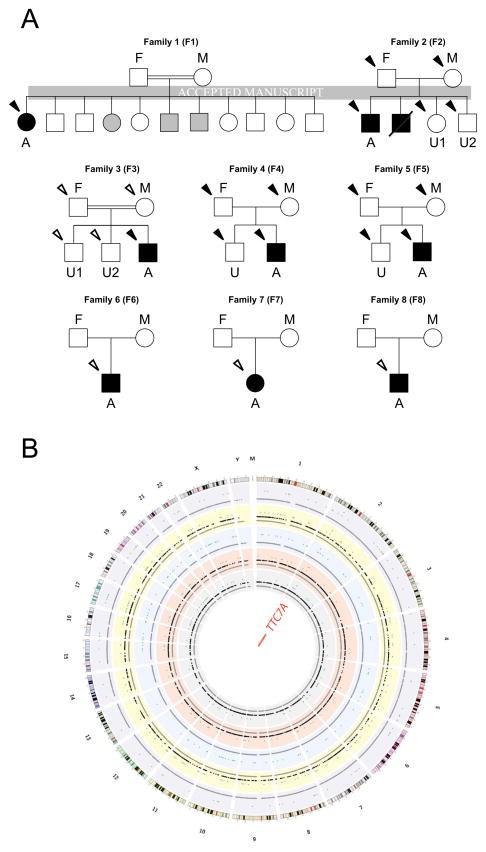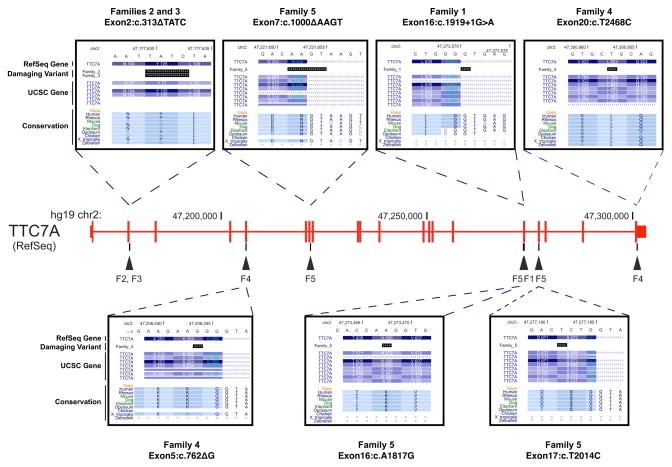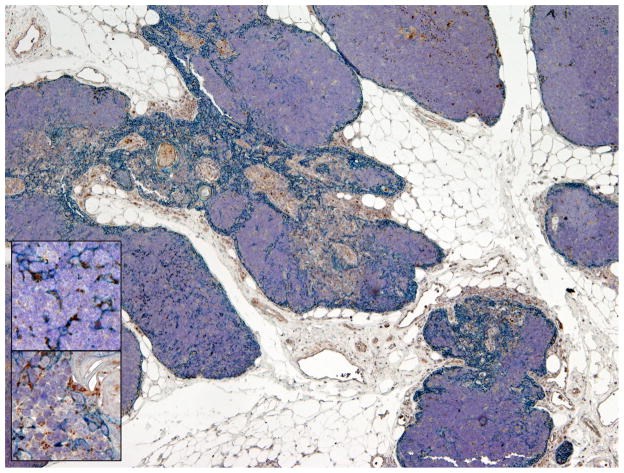Whole-exome sequencing identifies tetratricopeptide repeat domain 7A (TTC7A) mutations for combined immunodeficiency with intestinal atresias
Rui Chen 1, Silvia Giliani 2, Gaetana Lanzi 2, George I Mias 1, Silvia Lonardi 3, Kerry Dobbs 4, John Manis 5, Hogune Im 1, Jennifer E Gallagher 1, Douglas H Phanstiel 1, Ghia Euskirchen 1, Philippe Lacroute 1, Keith Bettinger 1, Daniele Moratto 2, Katja Weinacht 6, Davide Montin 7, Eleonora Gallo 7, Giovanna Mangili 8, Fulvio Porta 9, Lucia D Notarangelo 9, Stefania Pedretti 8, Waleed Al-Herz 10, Wasmi Alfahdli 11, Anne Marie Comeau 12, Russell S Traister 13, Sung-Yun Pai 14, Graziella Carella 15, Fabio Facchetti 3, Kari C Nadeau 16, Michael Snyder 17, Luigi D Notarangelo 18
Affiliations
Affiliations
- Department of Genetics, Stanford University School of Medicine, Stanford, Calif.
- A. Nocivelli Institute for Molecular Medicine, Pediatric Clinic, University of Brescia, and the Section of Genetics, Department of Pathology Spedali Civili, Brescia, Italy.
- Department of Pathology, University of Brescia, Brescia, Italy.
- Division of Immunology, Boston Children's Hospital, Harvard Medical School, Harvard Stem Cell Institute, Boston, Mass.
- Department of Transfusion Medicine, Boston Children's Hospital, Boston, Mass.
- Division of Hematology and Oncology, Boston Children's Hospital, Boston, Mass.
- Department of Public Health and Pediatrics, University of Torino, Torino, Italy.
- USC Patologia Neonatale, Ospedali Riuniti di Bergamo, Bergamo, Italy.
- Division of Pediatric Hematology-Oncology, Spedali Civili Brescia, Brescia, Italy.
- Department of Pediatrics, Al-Sabah Hospital, Kuwait City, Kuwait.
- Department of Surgery, Ibn-Sina Hospital, Kuwait City, Kuwait.
- New England Newborn Screening Program, University of Massachusetts Medical School, Worcester, Mass.
- Department of Internal Medicine, Children's Hospital of Pittsburgh, Pittsburgh, Pa.
- Division of Hematology-Oncology, Boston Children's Hospital, Boston, Mass.
- Clinical Immunology and Allergology, Spedali Civili Brescia, Brescia, Italy.
- Department of Pediatrics, Stanford University School of Medicine, Stanford, Calif. Electronic address: knadeau@stanford.edu.
- Department of Genetics, Stanford University School of Medicine, Stanford, Calif. Electronic address: mpsnyder@stanford.edu.
- Division of Immunology, Boston Children's Hospital, Harvard Medical School, Harvard Stem Cell Institute, Boston, Mass; Harvard Stem Cell Institute, Harvard Medical School, Boston, Mass. Electronic address: Luigi.Notarangelo@childrens.harvard.edu.
Abstract
Background: Combined immunodeficiency with multiple intestinal atresias (CID-MIA) is a rare hereditary disease characterized by intestinal obstructions and profound immune defects.
Objective: We sought to determine the underlying genetic causes of CID-MIA by analyzing the exomic sequences of 5 patients and their healthy direct relatives from 5 unrelated families.
Methods: We performed whole-exome sequencing on 5 patients with CID-MIA and 10 healthy direct family members belonging to 5 unrelated families with CID-MIA. We also performed targeted Sanger sequencing for the candidate gene tetratricopeptide repeat domain 7A (TTC7A) on 3 additional patients with CID-MIA.
Results: Through analysis and comparison of the exomic sequence of the subjects from these 5 families, we identified biallelic damaging mutations in the TTC7A gene, for a total of 7 distinct mutations. Targeted TTC7A gene sequencing in 3 additional unrelated patients with CID-MIA revealed biallelic deleterious mutations in 2 of them, as well as an aberrant splice product in the third patient. Staining of normal thymus showed that the TTC7A protein is expressed in thymic epithelial cells, as well as in thymocytes. Moreover, severe lymphoid depletion was observed in the thymus and peripheral lymphoid tissues from 2 patients with CID-MIA.
Conclusions: We identified deleterious mutations of the TTC7A gene in 8 unrelated patients with CID-MIA and demonstrated that the TTC7A protein is expressed in the thymus. Our results strongly suggest that TTC7A gene defects cause CID-MIA.
Keywords: CID-MIA; Combined immunodeficiency with multiple intestinal atresias; GATK; Genome Analysis Toolkit; Graft-versus-host disease; GvHD; HCT; Hematopoietic cell transplantation; Indels; Insertions and/or deletions; NMD; Nonsense-mediated decay; SCID; SNV; Severe combined immunodeficiency; Single nucleotide variant; T-cell receptor excision circle; TREC; TTC7A; Tetratricopeptide repeat domain 7A; WES; Whole-exome sequencing; tetratricopeptide repeat domain 7A; thymus; whole-exome sequencing.
Figures
Similar articles
Mou W, Yang S, Guo R, Fu L, Zhang L, Guo W, Du J, He J, Ren Q, Hao C, Gui J, Huang J.Front Immunol. 2021 Dec 15;12:759308. doi: 10.3389/fimmu.2021.759308. eCollection 2021.PMID: 34975848 Free PMC article.
Fernandez I, Patey N, Marchand V, Birlea M, Maranda B, Haddad E, Decaluwe H, Le Deist F.Medicine (Baltimore). 2014 Dec;93(29):e327. doi: 10.1097/MD.0000000000000327.PMID: 25546680 Free PMC article.
TTC7A mutations disrupt intestinal epithelial apicobasal polarity.
Bigorgne AE, Farin HF, Lemoine R, Mahlaoui N, Lambert N, Gil M, Schulz A, Philippet P, Schlesser P, Abrahamsen TG, Oymar K, Davies EG, Ellingsen CL, Leteurtre E, Moreau-Massart B, Berrebi D, Bole-Feysot C, Nischke P, Brousse N, Fischer A, Clevers H, de Saint Basile G.J Clin Invest. 2014 Jan;124(1):328-37. doi: 10.1172/JCI71471.PMID: 24292712 Free PMC article.
Mandiá N, Pérez-Muñuzuri A, López-Suárez O, López-Sanguos C, Bautista-Casanovas A, Couce ML.Medicine (Baltimore). 2018 Jun;97(23):e10939. doi: 10.1097/MD.0000000000010939.PMID: 29879038 Free PMC article. Review.
Multiple intestinal atresia with combined immune deficiency.
Notarangelo LD.Curr Opin Pediatr. 2014 Dec;26(6):690-6. doi: 10.1097/MOP.0000000000000159.PMID: 25268403 Review.
Cited by
Positive Newborn Screening for Severe Combined Immunodeficiency: What Should the Pediatrician Do?
Mongkonsritragoon W, Huang J, Fredrickson M, Seth D, Poowuttikul P.Clin Med Insights Pediatr. 2023 Mar 31;17:11795565231162839. doi: 10.1177/11795565231162839. eCollection 2023.PMID: 37025258 Free PMC article. Review.
Human thymus in health and disease: Recent advances in diagnosis and biology.
Bosticardo M, Notarangelo LD.Semin Immunol. 2023 Mar;66:101732. doi: 10.1016/j.smim.2023.101732. Epub 2023 Feb 28.PMID: 36863139 Review.
The genetics of monogenic intestinal epithelial disorders.
Babcock SJ, Flores-Marin D, Thiagarajah JR.Hum Genet. 2023 May;142(5):613-654. doi: 10.1007/s00439-022-02501-5. Epub 2022 Nov 23.PMID: 36422736 Free PMC article. Review.
Beyond PI3Ks: targeting phosphoinositide kinases in disease.
Burke JE, Triscott J, Emerling BM, Hammond GRV.Nat Rev Drug Discov. 2023 May;22(5):357-386. doi: 10.1038/s41573-022-00582-5. Epub 2022 Nov 14.PMID: 36376561 Free PMC article. Review.
A synonymous mutation in PI4KA impacts the transcription and translation process of gene expression.
Zhang K, Kang L, Zhang H, Bai L, Pang H, Liu Q, Zhang X, Chen D, Yu H, Lv Y, Gao M, Liu Y, Gai Z, Wang D, Li X.Front Immunol. 2022 Oct 19;13:987666. doi: 10.3389/fimmu.2022.987666. eCollection 2022.PMID: 36341355 Free PMC article.


